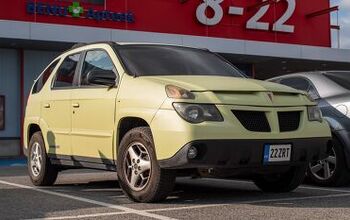Renault In Serious Talks With Daimler

Remember when Japan’s Nikkei said: “The latest round of partnerships is widely seen as just the beginning of a major shakeup of the auto making industry?” A kind of Japanese company, Renault (partner of Nissan) is engaged in heavy petting with yet another partner.
Reuters says French carmaker Renault is in talks with Daimler and others about partnerships. Areas covered include engines, transmission platforms, and access to new technologies, Renault COO Patrick Pelata confirmed today. He added: “We are discussing serious matters with Daimler.”
Both companies need help.
Daimler AG saw demand for luxury cars collapsing in the second half of 2008. In the January-to-November period of 2009, sales were down 11.8 percent at 1.02m cars sold worldwide.
Despite profiting heavily from various European cash for clunker schemes, Renault’s passenger car sales in the first 11 months of the year are down 2.1 percent to 1,852,917 vehicles.
On top of the malaise, there is this green trend that costs a lot of green in development money. You want to spread that across as many units as possible.
Pelata said that carmakers should “try to share the costs of access to new technologies, like the electric vehicle, batteries, fuel cells — anything that is very expensive … and which is a fixed cost but which they don’t want to abandon because they think these technologies could be necessary in the future.”
What’s more, both companies are looking with trepidation at 2010. All forecasts, including Pelata’s, say that next year, the European car market will contract as the C4C wears off. Pelata sees a 10 percent downturn for Europe in 2010. For key markets like Germany, a 25 percent drop is expected by several industry associations.

Bertel Schmitt comes back to journalism after taking a 35 year break in advertising and marketing. He ran and owned advertising agencies in Duesseldorf, Germany, and New York City. Volkswagen A.G. was Bertel's most important corporate account. Schmitt's advertising and marketing career touched many corners of the industry with a special focus on automotive products and services. Since 2004, he lives in Japan and China with his wife <a href="http://www.tomokoandbertel.com"> Tomoko </a>. Bertel Schmitt is a founding board member of the <a href="http://www.offshoresuperseries.com"> Offshore Super Series </a>, an American offshore powerboat racing organization. He is co-owner of the racing team Typhoon.
More by Bertel Schmitt
Latest Car Reviews
Read moreLatest Product Reviews
Read moreRecent Comments
- MaintenanceCosts Nobody here seems to acknowledge that there are multiple use cases for cars.Some people spend all their time driving all over the country and need every mile and minute of time savings. ICE cars are better for them right now.Some people only drive locally and fly when they travel. For them, there's probably a range number that works, and they don't really need more. For the uses for which we use our EV, that would be around 150 miles. The other thing about a low range requirement is it can make 120V charging viable. If you don't drive more than an average of about 40 miles/day, you can probably get enough electrons through a wall outlet. We spent over two years charging our Bolt only through 120V, while our house was getting rebuilt, and never had an issue.Those are extremes. There are all sorts of use cases in between, which probably represent the majority of drivers. For some users, what's needed is more range. But I think for most users, what's needed is better charging. Retrofit apartment garages like Tim's with 240V outlets at every spot. Install more L3 chargers in supermarket parking lots and alongside gas stations. Make chargers that work like Tesla Superchargers as ubiquitous as gas stations, and EV charging will not be an issue for most users.
- MaintenanceCosts I don't have an opinion on whether any one plant unionizing is the right answer, but the employees sure need to have the right to organize. Unions or the credible threat of unionization are the only thing, history has proven, that can keep employers honest. Without it, we've seen over and over, the employers have complete power over the workers and feel free to exploit the workers however they see fit. (And don't tell me "oh, the workers can just leave" - in an oligopolistic industry, working conditions quickly converge, and there's not another employer right around the corner.)
- Kjhkjlhkjhkljh kljhjkhjklhkjh [h3]Wake me up when it is a 1989 635Csi with a M88/3[/h3]
- BrandX "I can charge using the 240V outlets, sure, but it’s slow."No it's not. That's what all home chargers use - 240V.
- Jalop1991 does the odometer represent itself in an analog fashion? Will the numbers roll slowly and stop wherever, or do they just blink to the next number like any old boring modern car?































Comments
Join the conversation
“The latest round of partnerships is widely seen as just the beginning of a major shakeup of the auto making industry?” The words of the prophet are written on the subway walls...and in the journals of Nekkei apparently.
When I read the headline I was ready to jump into this all hot and heavy, but reading the article I see this nothing new. Renault-Volvo V6 anyone. Wow, it does add to page virews (I guess), but having such an extreme headline then such business-as-usual content. Help me TTAC, I'm not getting any younger! For those of you who might not be familiar w/ my beliefs and what I write here on TTAC, I mean, when I saw that headline WTF Daimler getting it's paws on Renault. NFW. Great that the rest of the article revealed that